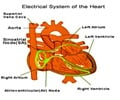In a study on fruit fly Drosophila, scientists at the Burnham Institute for Medical Research (Burnham) have found that genes involved in embryonic heart development are vital to adult
Scientists at the Burnham Institute for Medical Research (Burnham) have found that genes involved in embryonic heart development are vital to adult heart function in both fruit flies and humans.
Led by Rolf Bodmer, Ph.D., the study found that in the fruit fly Drosophila, interactions between cardiac nmr genes (TBX20 in humans) and other transcription factors, are involved in regulating cardiac performance, rhythm and heart muscle structure.In earlier studies, TBX20 and other congenital heart disease genes, were shown to be vital for the development of the embryonic heart first in flies and subsequently in mouse models.
But, the current study is the first indication that nmr/TBX20 also plays a role in adult heart function.
These genes are highly conserved from flies to humans and the study showed that some human individuals with structural congenital heart abnormalities, as well as problems with heart function, including arrhythmias and heart failure, also exhibited TBX20 mutations.
"These studies demonstrate that Drosophila has potential as a model system for exploring the genetics underlying human heart disease and for identifying new candidate genes that potentially cause heart disease," said Bodmer.
Scientists examined human subjects with structural congenital heart disease, as well as heart muscle dysfunction, to make the connection between human and Drosophila heart malfunction.
Advertisement
The variants indicated TBX20 may be involved in the development of cardiomyopathy.
Advertisement
The study was published in Proceedings of National Academy of Sciences.
Source-ANI
SRM














